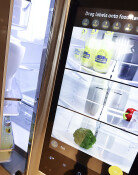Trade Discord over Beef Import Continues
Trade Discord over Beef Import Continues
Posted December. 05, 2006 07:07,
This steak is made from U.S. beef, said U.S. Senator Max Baucus one day before the fifth round of KORUS FTA negotiations. On December 3 (local time), he invited Lee Tae-sik, Korean ambassador to the U.S., and Susan C. Schwab, United States Trade Representative, to a restaurant in Big Sky, Montana. U.S. beef is safe whether they have bone or not, he emphasized while slicing the steak, saying, Mashisummida (tastes good) five times.
This event was followed by his warning in a speech: Korea should tear down the import barrier for U.S. beef if it wants successful FTA negotiations.
Trade discord between the two countries shows no signs of abating. Washington says Seouls refusal is an unprecedented response, while the Korean government argues that the agriculture authority implemented the bilateral agreement.
Arising Complaints-
This beef issue is not included in the KORUS FTA agenda. For sure, however, lawmakers are going to put pressure on me and Ms. Schwab, said Mike Johanns, head of the U.S. Department of Agriculture.
I would have strong doubt on even trade or diplomatic agreements between Seoul and Washington, wrote Senator Pat Roberts in a letter of complaint to Ambassador Lee.
One U.S. beef expert sarcastically said, It is technically impossible to have completely no bones while slicing huge amount of beefs with a sawing machine and processing them. I wonder what would happen if bone powder were discovered.
Whos Right?-
We understood boneless beef as beef without ribs when we agreed to that term, said one U.S. trade expert. He added that the unprecedented X-ray scanning of beef was not understandable, as sample testing was the normal practice.
However, Bae Jong-ha, leader of the International Agricultural Office in Koreas Agriculture and Forestry Ministry, emphasized that the term was based on mutual consensus.
Thorough testing is inevitable because of Koreas widespread negative perception of U.S. beef. What should we do if an opponent of U.S. beef import secretly puts a small bone in the imported goods after we go through simple sample testing and allow the distribution. He or she can argue that the U.S. broke the promise and the Korean government failed to safeguard public health, said one trade official under the condition of anonymity.
Just like Korea, Taiwan imports only boneless beef from the U.S. The Taiwanese government once returned shipped meat when some bones were found, and the size of the bone was too big for the U.S. government to complain. Canada imports raw beef, and Japan imports U.S. beef with bones.
Calls for Detailed Regulations-
It was confirmed that both countries did not make detailed regulations after reaching an agreement on the import of boneless beef on January 13 this year. This is similar to passing a law without any implementation rules.
Three hundred million American citizens, two million Koreans living in the U.S., and 700,000 Korean visitors to the United States every year eat American beef without any problems. Rational detailed standard should be rolled out as soon as possible, said one Washington trade expert.
This time the amount of beef subjected to testing was only nine tons. If we import 200,000 tons like in the past, we cannot test all of them even if all civil workers participate, one Korean official warned.
However, some strongly claim that linking this beef issue to the KORUS FTA negotiations by some American officials is against the objective of free trade agreement, abetting more anti-FTA sentiments in both countries.
sechepa@donga.com smhong@donga.com
Headline News
- Joint investigation headquarters asks Yoon to appear at the investigation office
- KDIC colonel: Cable ties and hoods to control NEC staff were prepared
- Results of real estate development diverged by accessibility to Gangnam
- New budget proposal reflecting Trump’s demand rejected
- Son Heung-min scores winning corner kick







